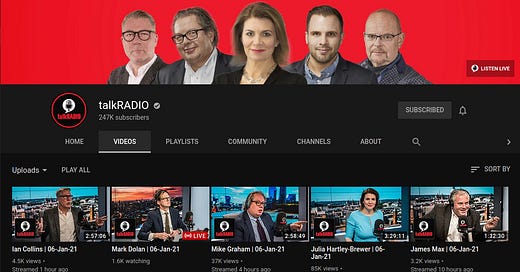I. TalkRADIO and YouTube
On Tuesday 5-Jan-2021 Google’s YouTube took down the TalkRADIO channel (they brought it back up a few hours later).
This was covered on Tuesday’s Newsnight (segment beginning 31:15). Google said they did this because Talk Radio disagreed with what Google called “mainstream advice on Covid 19”.
Some people on Twitter have argued that this isn’t a free speech issue because free speech doesn’t imply the right of access to a privately-owned platform. Examples:
While I would have considerable sympathy for this view if YouTube was a minor platform, instead it’s a dominant one owned by a trillion-dollar company, Google. And because of network effects, people cannot simply create their own platform to compete with YouTube, as it would get nowhere. Network effects are why social media has consolidated into a few dominant players such as Google, Facebook and Twitter.
So saying “YouTube has a right to censor their platform” is in effect saying “Big Corporations have a right to control what information people have access to, and therefore what they think”.
If you question whether Google does in fact control what people think, consider that they make their money through advertising and they have a trillion dollar market capitalisation. To put it another way: the consensus among people prepared to put their money where their mouth is, is that Google has $1tn worth of ability to control others. This implies a significant amount of control over what people do, and therefore what they think.
Once Google et al control who is allowed to get a platform, they decide which points of view will be heard and which politicians can get elected. Once they do that, a country is no longer a democracy, it is an oligarchy controlled by Google.
So saying “YouTube has a right to censor their platform” is in effect saying “I hate democracy, I want to be controlled by big corporations, and Google should never have to pay a penny in taxes”. Is that really what you want, people who support Google censorship?
II. So what’s the solution?
One possible solution is Poland’s: mandate that big social media companies cannot block legal content:
Poland’s national conservative government has detailed a new law protecting free speech online against Big Tech censorship, backed by a new court and big fines.
Minister of Justice Zbigniew Ziobro has announced the draft ‘Act for the Freedom to Express One’s Views and Obtain and Disseminate Information on the Internet’ will give social media users a statutory right to appeal bans and content removals on social media platforms such as Facebook on Twitter, which they will be able to escalate to a new Court for the Protection of Freedom of Speech in a streamlined, all-digital process.
If the new court rules that the tech censors have removed accounts or deleted posts for speech which is legal under Polish law, they must be restored — or the social media firms involved will face fines of as much as 1.8 million euros
I’m not sure how that would in practice work, in particular whether it would mean platforms cannot take down spam.
Another is to mandate that all social media had to be interoperable, using ActivityPub or similar protocols, leading to a Fediverse of interoperable platforms that anyone can add to.
As James Moulding (@jamesforthemany) and Irina Bolychevsky (@shevski) have argued:
Government should focus on extending the GDPR rights around data portability and enshrining the use of open standards and protocols when it comes to communication and social media. Not only is this technically feasible, there are in fact numerous mature projects in this space. Standards bodies like the W3C (founded by Tim Berners-Lee) have been developing standards for federating updates across services and devices for over a decade. Matrix, a project to decentralise communication, have created an open protocol iterating on XMPP, which can be used by any chat client.
Not that many years ago, open protocols like XMPP allowed users to chat across and between a range of apps. You could run Pidgin or one of its many competitors to message your friends on Facebook, Google, MSN and IRC all from one application. Yet as Facebook and Google became more powerful and dominant, they stopped supporting these open protocols, forcing users to juggle numerous siloed accounts. The needs of users have been overwritten by the desire of digital monopolies to control the content in their walled gardens in order to better serve their customers - advertisers and data buyers.
Now, just email stands alone. For now, a Gmail account lets you email anyone regardless of the email client they’re running, whether it’s Hotmail, ProtonMail or Yahoo. Can you imagine using WhatsApp to chat to your friends on Reddit or share photos from Flickr to Facebook and still see likes and comments? That’s the power of open protocols.
Even if most people would choose to stay with Facebook, the option of genuine alternatives which users could switch to easily and not lose touch with their existing friends would help keep current giant digital monoliths accountable akin to the Digg Exodus of 2010. Supporting open protocols and standards will enable an ecosystem of viable alternatives that will drive innovation and user choice, privacy and resilience. We want a world where you don’t lose everything if Google decides to delete your account, a world where your data won’t be hacked or spied on - where users can finally migrate away from predatory, privacy-infringing corporate networks and central points of failure.
This would be the main part of my preferred solution. Of course there would have to be teeth in any regulation of this kind: Big Tech would be required or properly open up their platforms, not merely go through the motions of doing so — with crippling fines if they fail to comply.
I would also make it illegal for the same company to own multiple social media platforms — so Facebook would have to divest itself of Instagram and WhatsApp.
















